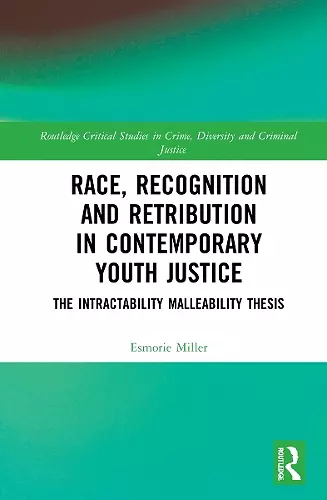Race, Recognition and Retribution in Contemporary Youth Justice
The Intractability Malleability Thesis
Format:Hardback
Publisher:Taylor & Francis Ltd
Published:31st Dec '21
Currently unavailable, and unfortunately no date known when it will be back
This hardback is available in another edition too:
- Paperback£41.99(9781032195575)

Race, Recognition and Retribution in Contemporary Youth Justice provides a cross-national, sociohistorical investigation of the legacy of racial discrimination, which informs contemporary youth justice practice in Canada and England. The book links racial disparities in youth justice, especially exclusion from ideologies of care and notions of future citizenship, with historical practices of exclusion.
Despite the logic of care found in both rehabilitative and retributive forms of youth justice, Black inner-city youth remain excluded from lenience and social welfare considerations. This exclusion reflects a historical legacy of racial discrimination apparent in the harsher sanctions levied against Black, innercity youth. In exploring race’s role in this arrangement, the book asks: To what extent were Black youth excluded from historic considerations of the lenience and social care, built into the logic of youth justice in England and Canada? To what extent are the disproportionately high incarceration rates, for Black, inner-city youth in the contemporary system, a reflection of a historic exclusion from considerations of lenience and social care? How might contemporary justice efforts be reoriented to explicitly prioritize considerations of lenience and social care ahead of penalty for Black, inner-city youth?
Examining the entrenched structural continuities of racial discrimination, the book draws on archival and interview data, with interviewees including professionals who work with inner-city youth. In concert with the archival and interview data, the book offers the intractability/malleability I/M thesis, an integrated social theoretical logic with the capacity to expand the customary analytical scope for understanding the contemporary entrenched normalization of racialized youth as punishable. The aim is to advance a historicized account, exploring youth’s positioning as constitutive of a continuity of racialized peoples’, in general, and youth’s, in particular, historic exclusion from the benefits of modern rights, including lenience and care. The I/M logic takes its analytical currency from a combined critical race theory (CRT) and recognition theory. The book argues that a truly progressive era of youth justice necessitates cultivating policy and practice which explicitly prioritizes considerations of lenience and social care, ahead of reliance on penalty.
This multidisciplinary book is valuable reading for academics and students researching criminology, sociology, politics, anthropology, critical race studies, and history. It will also appeal to practitioners in the field of youth justice, policymakers, and third-sector organizations.
‘Always historicise!’ is the admonishment offered by the literary critic Frederic Jameson. It is advice well taken in this powerful and necessary account of the durable but underexamined black presence in youth justice. Miller takes England and Canada as illuminating case studies to restore both history and race to the analytical lens of youth justice reform. You will be astonished by what you might have missed if you thought race played only a peripheral role in the historical shaping of youth justice institutions, practice and policy. The familiar oscillating priorities of coercion and care, punishment and welfare might characterise the predicaments of white working class youth, but for non-White youth the assumptions about the intrinsic ‘malleability of youth’ are replaced with the ‘intractability of race’. Miller uses history to show how this binary placed Black young people beyond the dubious animating ambitions of penal reform and rehabilitation. With meticulous and erudite scholarship, she shows how the now discredited justifications of eugenics are replaced by new racialisations. The all to recognisable contemporary effects of excessive punishments and exclusions derive from this, often unspoken, assumption of racial intractability. Racialised punishments, suspicions and retributions are warnings from history we ignore at our peril. Take some advice and get yourself this book.
Dr. Rod Earle, Open University
“This is a beautifully written book that is as insightful as it is enjoyable to read. The argument that Black, racialized youth have the status of an intractably deviant outsider in contrast to the more malleable status of White, working class youth is compelling. A thought provoking book and an essential read for anyone who wants to understand the role of race in contemporary youth justice.”
Prof. Andrew Whittaker, London South Bank University
Using the concepts of intractability and malleability, this indispensable book demonstrates how Black, racialized young people have been excluded from receiving justice in the UK and Canada. Whereas white young people have historically been seen as susceptible to reform, Black young people have been rendered punishable. Miller breaks new ground in demonstrating the continuity of racism and punitiveness in youth justice in the UK and Canada, not as a bug in the system but as part of its design. Her work blends empirical evidence with deep theoretical reflection.
Dr Lizzie Seal, Sussex University
Miller introduces the intractability/malleability thesis, based on Critical Race Theory and Recognition Theory, to examine the disproportionate classification of Black youth as deviant and thus their over-representation in incarceration records and facilities. This very timely and informative analysis of the historical and socio-political depiction of youth violence brings attention to systemic racism prevalent in youth justice systems in the UK and Canada. Miller merges diverse literatures as she provides a critical assessment of youth justice systems while providing an important contribution to the understanding of the role of race and racism in youth violence and youth justice.
Prof. Finn-Aage Esbensen, University of Missouri-St. Louis
ISBN: 9781138488793
Dimensions: unknown
Weight: 412g
174 pages